
The Best Poetry of Sadness: Heartfelt Verses for Reflection
- On
- InSad Poetry
Sadness is a profound human emotion, one that has inspired countless generations of poets to articulate the inexpressible. Through poignant words, imagery, and artful metaphors, poetry has long allowed both writers and readers to explore, confront, and reflect upon their innermost sorrow. This blog dives into the ways sadness is expressed in poetry, presenting the best poems that echo the heart’s melancholic moments, and even gifting poetry lovers 20 original two-line poems in Urdu, Roman Urdu, and English.
Understanding Sadness through Poetry
Poetry thrives on emotional depth, and sadness sits at its very core. Whether it’s the yearning for a lost loved one, heartbreak, a struggle with mental health, or simply the melancholia of life’s fleeting beauty, poetry offers a mirror that reflects and magnifies human experiences. It is natural to feel sad, and poetry provides a means to express and share these emotions, helping individuals to process their feelings. Through the elegance of language, poets open pathways for readers to reconnect with their emotions and discover solace amid sorrow.
By understanding sadness in poetry, we can recognize it as a shared human experience, a reminder that, in our darkest moments, we are never alone.
The Power of Sadness in Poetry
Poets transform the sad feeling into universal expressions of the human condition, offering solace and insight to readers. By facing sadness head-on through poetry, writers and readers alike find a space to process and make sense of their emotions.
Finding Comfort in Sad Poems
There is comfort in recognition. These poems often delve into the depths of just sadness, capturing the profound emotional struggles that many face. Reading about sadness helps us feel seen, heard, and validated. Whether it’s John Keats’ “Ode on Melancholy,” Emily Dickinson’s “I Measure Every Grief I Meet,” or W.H. Auden’s “Funeral Blues,” these poems provide a safe haven for contemplation and healing.
20 Two-Line Poems of Sadness
Below are two-line poems in three formats: Urdu, Roman Urdu, and English. Each pairing reflects on themes of sorrow, loss, and reflection.

دل کی داستانوں سے بھری رات ہے
آنسوؤں کی بارش میں خاموشی بستی ہے۔
Roman Urdu:
Dil ki dastaano se bhari raat hai
Aansuon ki baarish mein khamoshi basti hai.
English:
The night is filled with stories of the heart
Silence dwells amidst the rain of tears.

زندگی کا رنگ اب تیرا خواب بن گیا
جسے چھوڑ آئے تو دل پر زخم بنا گیا۔
Roman Urdu:
Zindagi ka rang ab tera khwaab ban gaya
Jise chhod aaye to dil par zakhm bana gaya.
English:
Life’s color has now turned into your dream
Leaving it behind left a wound on my heart.
Urdu:
غم کی شراب پی کر جی بھر کے رو دیا
کہیں اداسی نے موسم بدل دیا
Roman Urdu:
Gham ki sharab pi kar je bhar ke ro diya
Kahin udaasi ne mausam badal diya.
English:
Drinking the wine of sorrow, I cried my heart out
Somewhere, melancholy changed the season.
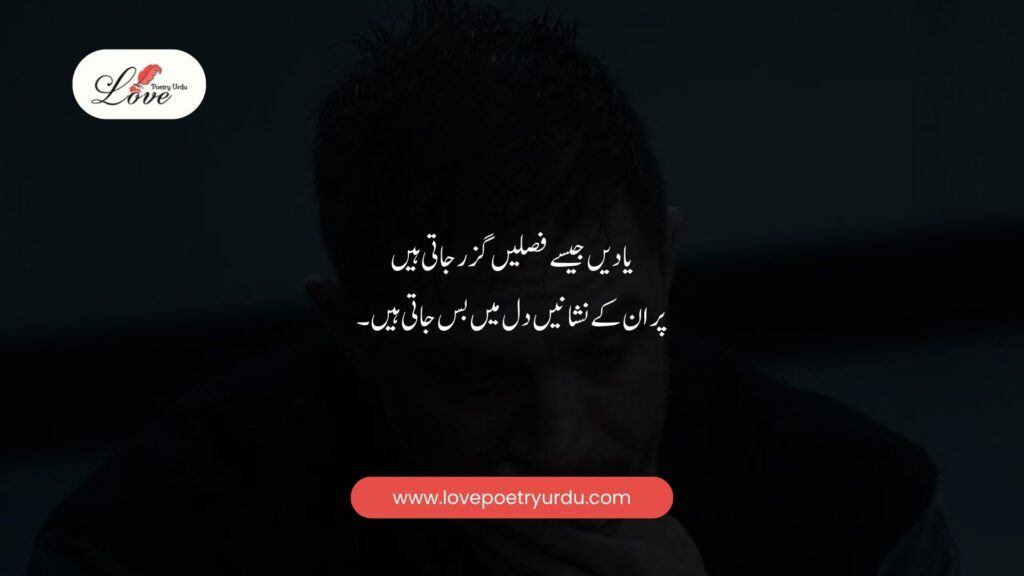
یادیں جیسے فصلیں گزر جاتی ہیں
پر ان کے نشانیں دل میں بس جاتی ہیں۔
Roman Urdu:
Yaadein jaise faslein guzar jaati hain
Par unke nishaaniyan dil mein bas jaati hain.
English:
Memories pass like seasons
But their marks settle deep within the heart.
Urdu:
تیری محفل میں بیٹھ کر بھی تنہائی ہے
جو لمحے گزرے وہ سب غم کی داستانیں ہیں۔
Roman Urdu:
Teri mehfil mein baith kar bhi tanhai hai
Jo lamhe guzre woh sab gham ki dastaaniyan hain.
English:
Even sitting in your gathering feels lonely
Every moment that passes is a tale of sorrow.
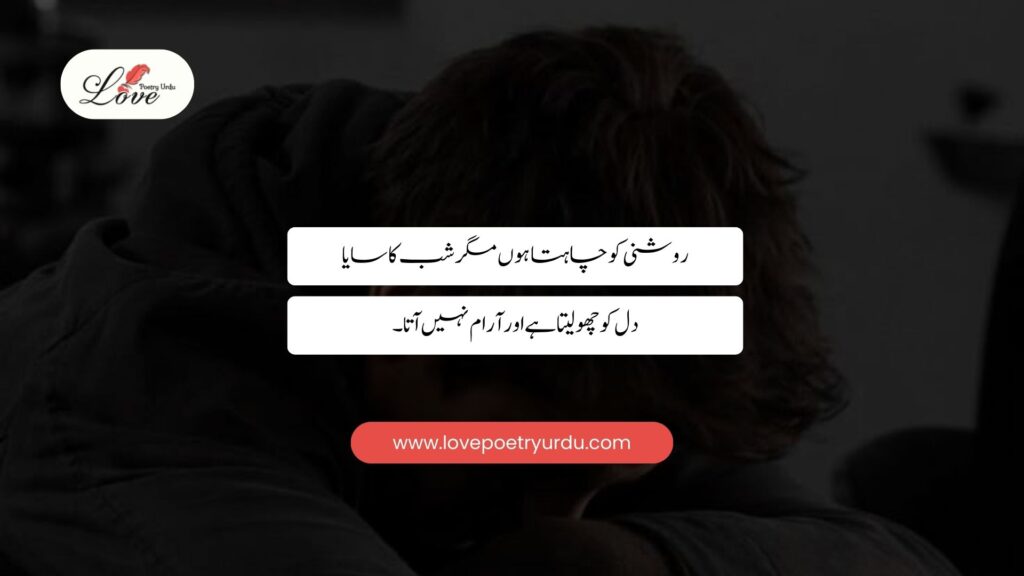
روشنی کو چاہتا ہوں مگر شب کا سایا
دل کو چھو لیتا ہے اور آرام نہیں آتا۔
Roman Urdu:
Roshni ko chahta hoon magar shab ka saaya
Dil ko chhu leta hai aur araam nahi aata.
English:
I yearn for light but the shadow of night
Touches my heart, bringing no peace at all.

میں نے دیکھا تیرے بغیر زندگی کو
ایک ایسا صحرا جہاں ہوا بھی نہیں چلتی۔
Roman Urdu:
Maine dekha tere baghair zindagi ko
Ek aisa sahra jahan hawa bhi nahi chalti.
English:
I saw life without you—
A desert where even the wind doesn’t blow.
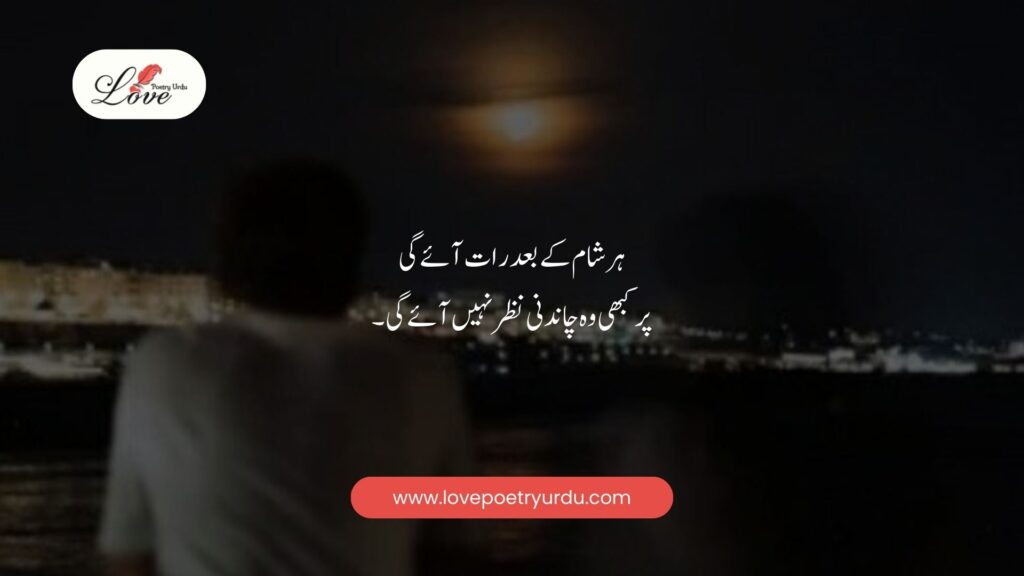
ہر شام کے بعد رات آئے گی
پر کبھی وہ چاندنی نظر نہیں آئے گی۔
Roman Urdu:
Har sham ke baad raat aayegi
Par kabhi woh chaandani nazar nahi aayegi.
English:
After every evening comes the night
But never again will that moonlight appear.
Urdu:
دل کی دھڑکنوں میں سمی ہوئی ہے صدا
تم نام کہتے ہو جو آج بھی دل کو چھو جاتا ہے۔
Roman Urdu:
Dil ki dhadkno mein sami hui hai sada
Tum naam kehte ho jo aaj bhi dil ko chhu jata hai.
English:
The echo rests within the beats of my heart
Your name still touches my soul when called today.

تم کبھی نہ آؤ تو یہی حال رہے گا
دل کا یہ درد کبھی کم نہیں ہوگا۔
Roman Urdu:
Tum kabhi na aao to yehi haal rahega
Dil ka yeh dard kabhi kam nahi hoga.
English:
If you never come, this state shall remain
This pain in my heart will never subside.
Urdu:
آنسوؤں نے مجھے سکون سے الگ کر دیا
اب جیسے زندگی کا مذاق بدل گیا۔
Roman Urdu:
Aansuon ne mujhe sukoon se alag kar diya
Ab jaise zindagi ka mazaq badal gaya.
English:
Tears have separated me from peace
Now life’s essence seems to have changed.

غم کی داستانوں کو کہانی سمجھ لیا
پر دل کی گہرائیوں کو کبھی نہیں سمجھ پایا۔
Roman Urdu:
Gham ki dastaanon ko kahani samjh liya
Par dil ki gehraiyo ko kabhi nahi samjha paya.
English:
I understood stories of sorrow as mere tales
But could never fathom the depths of my heart.
Urdu:
تمہارے بغیر سفروں کا کیا معنی؟
راتوں کی طرح گہری اور خاموش راہیں۔
Roman Urdu:
Tumhare baghair safro ka kya matlab?
Raton ki tarah gehri aur khamosh rahein.
English:
What meaning do journeys hold without you?
Like nights, they are deep and silent pathways.

دل کی باتیں کہنا آسان نہیں
غم کے آگوشت میں ہر لمحہ تنگ ہے۔
Roman Urdu:
Dil ki baatein kehna aasan nahi
Gham ke aagosh mein har lamha tang hai.
English:
It’s not easy to speak the heart’s truths
Each moment is suffocating under sorrow’s embrace.
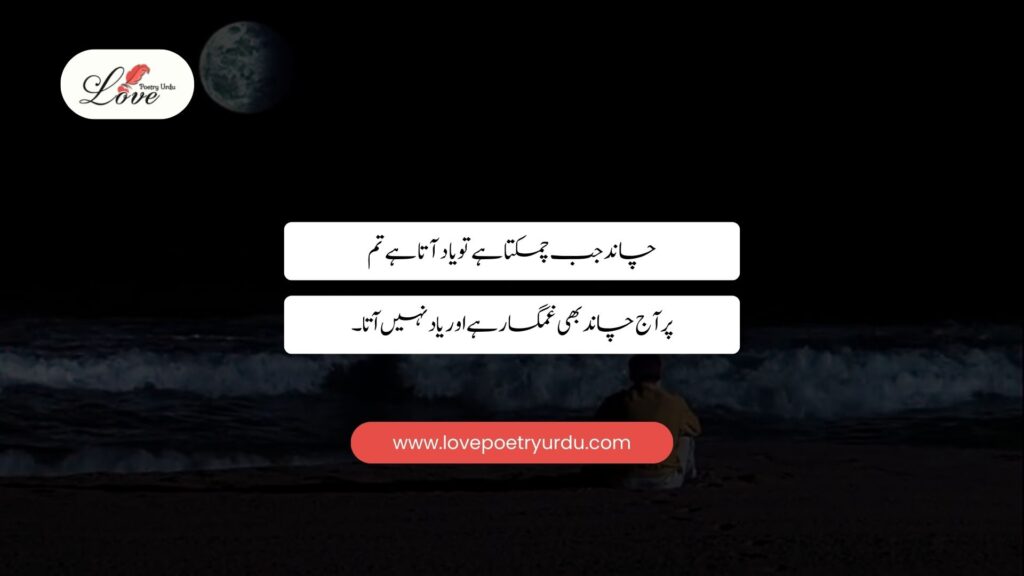
چاند جب چمکتا ہے تو یاد آتا ہے تم
پر آج چاند بھی غمگسار ہے اور یاد نہیں آتا۔
Roman Urdu:
Chaand jab chamakta hai to yaad aata hai tum
Par aaj chaand bhi gammgstar hai aur yaad nahi aata.
English:
When the moon shines, I remember you
But today, even the moon mourns, and memories don’t come.

ہر شام کو دیکھ کر سوچتا ہوں میں
کہ کب آئے گی وہ شام جو دل کو چین دے۔
Roman Urdu:
Har sham ko dekh kar sochta hoon main
Ke kab ayegi woh sham jo dil ko chain de.
English:
Watching each evening, I wonder,
When will the evening arrive that brings peace to my heart?

غم کی دنیا میں ہر قدم ایک نئی آہ ہے
بے اختیار ہوں میں اس دوڑ کے دور میں۔
Roman Urdu:
Gham ki duniya mein har qadam ek nayi aah hai
Be ikhtiar hoon main iss dor ke dour mein.
English:
In the world of sorrow, every step is a new sigh,
I am powerless in this endless race.

یہ دل کی داستان اتنی طویل کیوں؟
ہر صفحہ پڑھنے پر ایک نیا دکھ ملتا ہے۔
Roman Urdu:
Yeh dil ki dastaan itni tool kyun?
Har safha padhne par ek naya dukh milta hai.
English:
Why is this story of the heart so long?
On every page, a new sorrow unfolds.
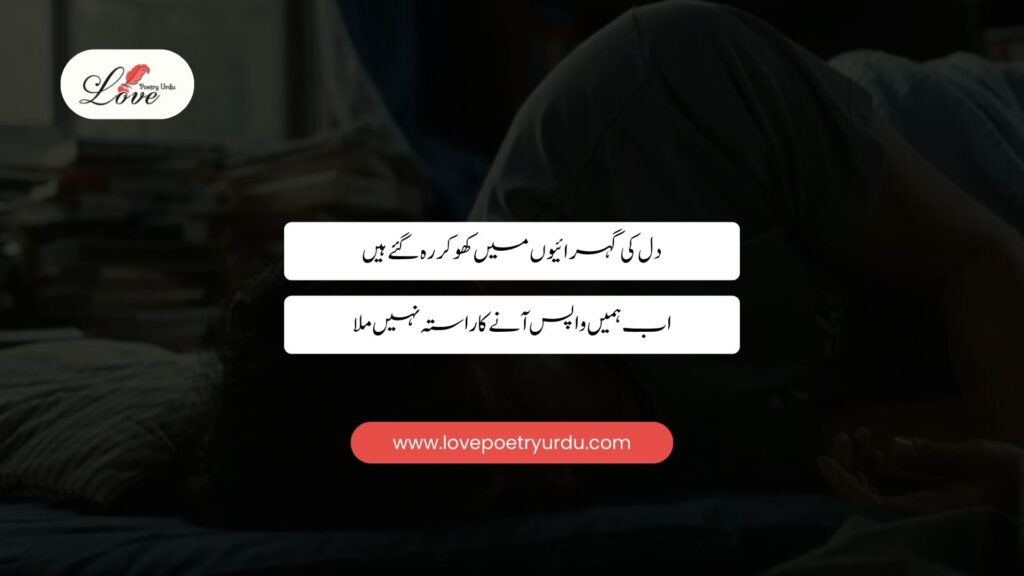
دل کی گہرائیوں میں کھو کر رہ گئے ہیں
اب ہمیں واپس آنے کا راستہ نہیں ملا۔
Roman Urdu:
Dil ki gehraiyo mein kho kar reh gaye hain
Ab humein wapas ane ka rasta nahi mila.
English:
Lost in the depths of our hearts
we remain, Now we cannot find the way back.

غم کا سفر اتنا لمبا کیوں؟
ہر منزل پر صرف آنسو ہیں برسانے والے۔
Roman Urdu:
Gham ka safar itna lamba kyun?
Har manzil par sirf aansu hain barsane walay.
English:
Why is the journey of sorrow so long?
At every stop, only tears fall like rain.
The Timeless Appeal of Sadness in Poetry
Sadness in poetry is timeless because it reflects a universal truth of the human condition. The struggles of a young man, depicted in poetry, highlight the universal challenges and emotional battles faced by individuals across time. This is why, across generations and cultures, poetry serves as a bridge that connects us with those who’ve walked this path before us and will after us.
If you are a poetry lover, take time to read, reflect, and, if inspired, try writing your own words. Poetry provides a timeless solace that reminds us we’re never truly alone.





